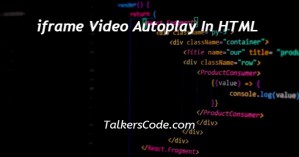Javascript Load JSON File Into Variable
Last Updated : Mar 11, 2024
IN - Javascript | Written & Updated By - Riya

In this article we will show you the solution of JavaScript load JSON file into variable, we will learn how to load a JSON file and store its content into a JavaScript variable.
JSON (JavaScript Object Notation) is a lightweight data-interchange format commonly used for data storage and communication between a server and a web application.
We will explore a simple and efficient method to load JSON files using JavaScript.
To load a JSON file into a variable in JavaScript, we utilize the XMLHttpRequest object. This object allows us to send HTTP requests.
We create a new instance of XMLHttpRequest and configure it to make a GET request to the URL of the JSON file.
We set the MIME type of the request to indicate that we expect a JSON response.
We define an onreadystatechange event handler that checks if the request is completed and if the status is 200 (indicating a successful request). Once the request is successfully completed, we call a callback function and pass the response text as an argument.
Inside the callback function, we parse the response text into a JSON object using JSON.parse() and store it in a variable.
Finally, we can access and manipulate the JSON data within the callback function.
By following these steps, we can effectively load a JSON file into a JavaScript variable for further processing and utilization.
Step By Step Guide On JavaScript Load JSON File Into Variable :-
function loadJSON(callback) {
var xhr = new XMLHttpRequest();
xhr.overrideMimeType("application/json");
xhr.open('GET', 'path/to/file.json', true);
xhr.onreadystatechange = function () {
if (xhr.readyState === 4 && xhr.status === 200) {
callback(xhr.responseText);
}
};
xhr.send(null);
}
loadJSON(function (response) {
var jsonData = JSON.parse(response);
console.log(jsonData);
});
- We define a function loadJSON that takes a callback parameter. This function will handle loading the JSON file.
- Inside the load JSON function, we create a new instance of XMLHttpRequest and assign it to the xhr variable.
- We set the MIME type of the request to "application/json" using xhr.overrideMimeType to ensure the response is treated as JSON.
- We use xhr.open to initialize a GET request to the JSON file's URL. Replace 'path/to/file.json' with the actual path to your JSON file.
- We set the onreadystatechange event handler to check if the request is completed (readyState === 4) and the status is 200 (indicating a successful request).
- Inside the event handler, we call the callback function with the response text using xhr.responseText.
- Finally, we send the HTTP request using xhr.send(null).
Conclusion :-
By using the XMLHttpRequest object in JavaScript, we can easily load a JSON file into a variable.
This method allows us to asynchronously load the file and handle its content once the request is successfully completed.
JSON data can then be accessed and manipulated in the callback function, providing a flexible way to work with external data sources in our JavaScript applications.
Remember to replace 'path/to/file.json' with the actual path to your JSON file.
With this technique, you can incorporate JSON data into your JavaScript applications and leverage it to enhance the functionality and interactivity of your web pages.
I hope this article on JavaScript load JSON file into variable helps you and the steps and method mentioned above are easy to follow and implement.













